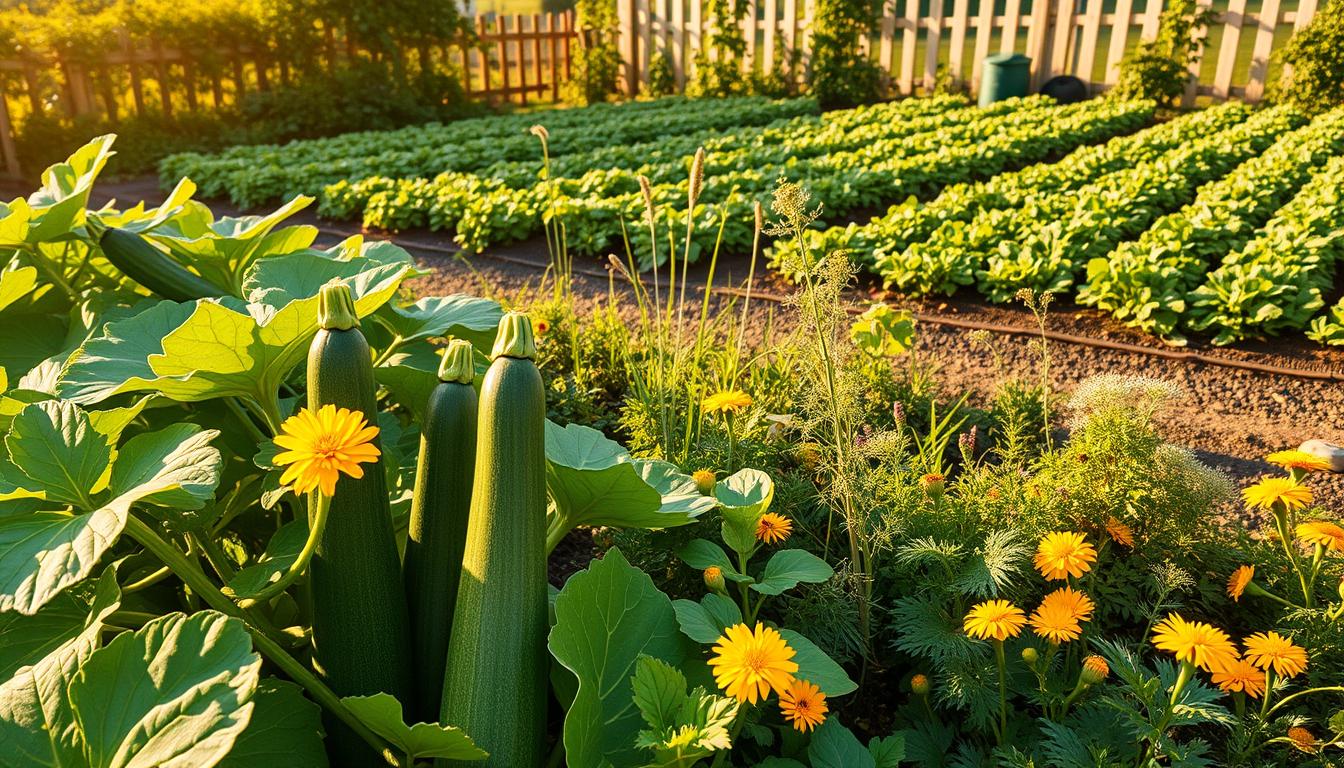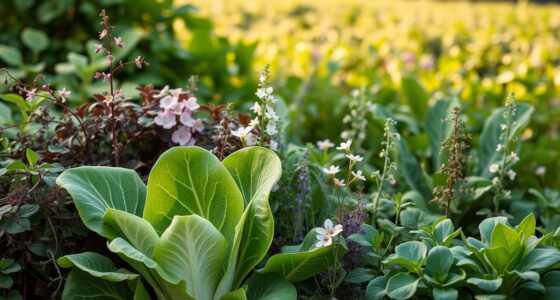Imagine stepping into your garden, where the vibrant green leaves of zucchini intertwine with the blossoming flowers of companion plants. The sweet aroma of fresh herbs and the buzzing of bees create a harmonious atmosphere, reminding you why you started gardening in the first place. Growing zucchini isn’t just about nurturing one plant; it’s about creating a thriving ecosystem where zucchini plant buddies can flourish by your side. These zucchini garden companions support each other, enhancing growth, deterring pests, and promoting a healthy environment. Discovering the best companions for zucchini will not only boost your harvest but provide you with satisfaction and connection to nature. Let’s explore how to cultivate this wonderful partnership in your garden!
Key Takeaways
- Companion planting enhances the growth of zucchini significantly.
- Choosing the right zucchini companion plants can help deter pests.
- Complementary plant pairings create a healthier garden ecosystem.
- Understanding plant relationships is crucial for successful gardening.
- Effective zucchini plant companionship can lead to bigger, tastier harvests.
What Are Companion Plants for Zucchini?
Companion planting is a gardening practice that involves growing different plants together to enhance each other’s growth. In the case of zucchini, certain species serve as effective partners, known as zucchini companion plants. These selected companions can boost the health and productivity of zucchini while providing various benefits to the overall garden ecosystem. Understanding the best companions for zucchini can lead to remarkable improvements in your gardening success.
Benefits of Companion Planting
Engaging in companion planting offers several advantages that can greatly benefit your zucchini crops:
- Increased biodiversity, which creates a more resilient garden environment.
- Enhanced pollination, improving fruit set and yield.
- Reduction in pest problems through natural repellents and barriers.
- Disease prevention by promoting healthier plants.
- Physical support for growing zucchini, especially in smaller garden spaces.
How Companion Plants Help Zucchini
Certain plants can specifically enhance zucchini planting combinations. For example:
- Marigolds deter pests like whiteflies and nematodes, providing an additional layer of protection.
- Legumes, such as beans, enrich the soil by fixing nitrogen, positively impacting the growth of surrounding zucchini.
- Other flowering plants attract beneficial insects that aid in pollination, enhancing the overall yield of zucchinis.
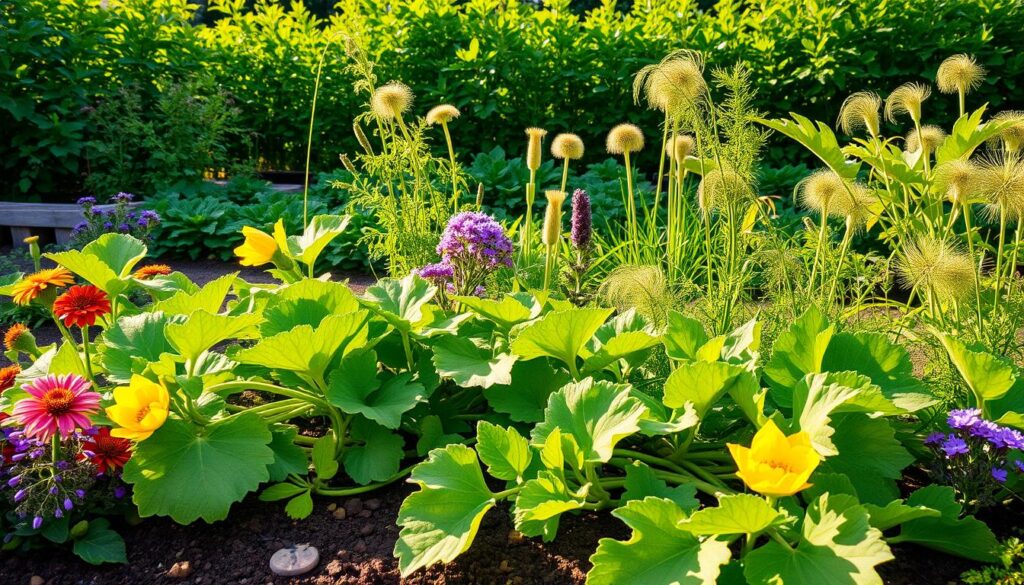
Ideal Companion Plants for Zucchini
Finding the right zucchini companion plants can significantly enhance your garden’s productivity. Several plants complement zucchini, offering a range of benefits that contribute to healthier crops and richer flavors. Understanding these ideal partners for zucchini can lead to a more fruitful growing experience.
Marigolds
Marigolds are fantastic zucchini plant friends that deter pests through their strong scent. Garden pests, such as nematodes, often stay clear of marigold plants, allowing your zucchini to thrive without interference. Planting them alongside zucchini can create a natural shield, making your garden more resilient overall.
Nasturtiums
Nasturtiums serve as a dual benefit for zucchini gardening. They attract beneficial insects while acting as natural traps for aphids. This keeps aphids away from your zucchini, reducing the risk of infestations. With vibrant flowers and edible leaves, nasturtiums are not only functional but also enhance the aesthetics of your garden.
Basil
Basil stands out as one of the ideal partners for zucchini, providing both culinary and horticultural advantages. This aromatic herb deters harmful insects that may threaten your zucchini, while its flavor enhances dishes featuring this versatile squash. When planted together, zucchini and basil create a harmonious garden relationship, benefiting your palate as well as your plants.

Plants to Avoid Near Zucchini
Growing zucchini can be a rewarding experience, but knowing which plants to avoid is just as important as choosing the right zucchini companion plants. Certain neighbors in your garden can lead to competition for essential nutrients or attract pests that could harm your zucchini. Below are key plants to steer clear of when cultivating your zucchini garden companions.
Potatoes
Potatoes are notorious for competing with zucchini for nutrients. When planted nearby, they can inhibit the growth of your zucchini plants, leading to poor yields. Keeping these two separate allows each to thrive without the struggle for resources.
Cucumbers
Cucumbers belong to the same family as zucchini, making them susceptible to similar pests and diseases. Their proximity can increase the risk of infestation, which could affect your zucchini harvest. For a healthier garden, maintain distance between these crops.
Other Nightshades
Plants such as tomatoes and peppers are considered nightshades and can compete with zucchini for nutrients. The competition may weaken your zucchini plants, resulting in stunted growth. Being mindful of your garden layout and avoiding these plants helps ensure a robust zucchini harvest.
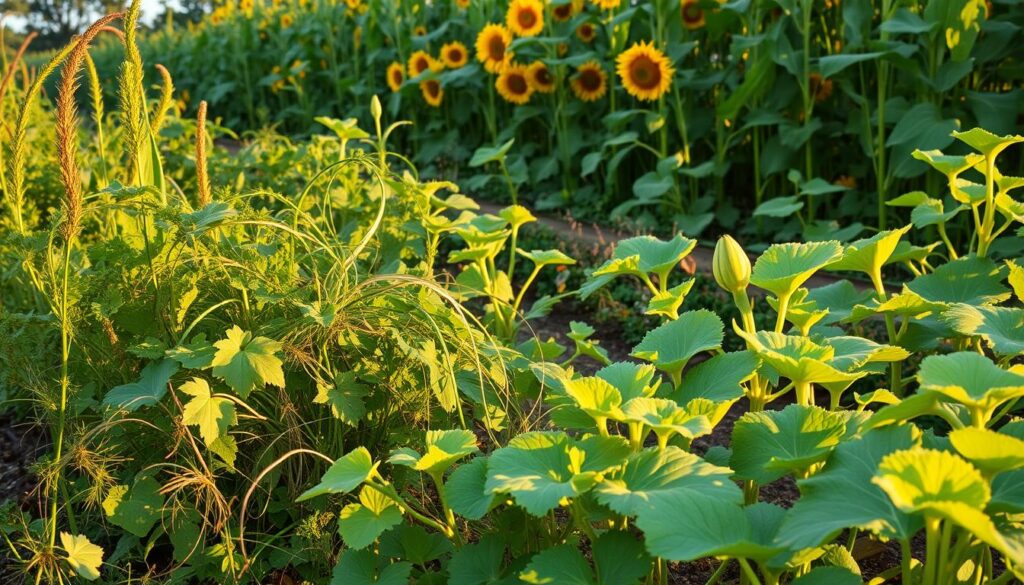
Enhancing Growth with Companion Plants
Utilizing companion plants can be a game-changer for your zucchini gardening strategies. These plants enhance growth in several ways, particularly through nutrient sharing, pest control, and improving soil health. Understanding how to effectively incorporate these elements can lead to thriving zucchini plants and an overall productive garden.
Nutrient Sharing
Many companion plants release essential nutrients, particularly nitrogen, which zucchini requires for robust growth. Leguminous plants, like beans and peas, enrich the soil by engaging in a symbiotic relationship with nitrogen-fixing bacteria. This nutrient sharing can significantly boost your zucchini planting combinations, leading to more bountiful harvests.
Pest Control
Companion plants can also serve as a natural deterrent for pests that commonly afflict zucchini. For instance, marigolds emit a scent that repels harmful insects. By including these aromatic plants, you can protect your zucchini crops from invasive pests while promoting a healthier ecosystem in your garden.
Soil Health
Maintaining healthy soil is vital for the success of zucchini gardening strategies. Companion plants can improve soil structure and fertility, which benefits moisture retention and nutrient availability. Cover crops like clover or rye can enhance soil health during off-seasons, ultimately supporting your zucchini growth when it’s time to plant.
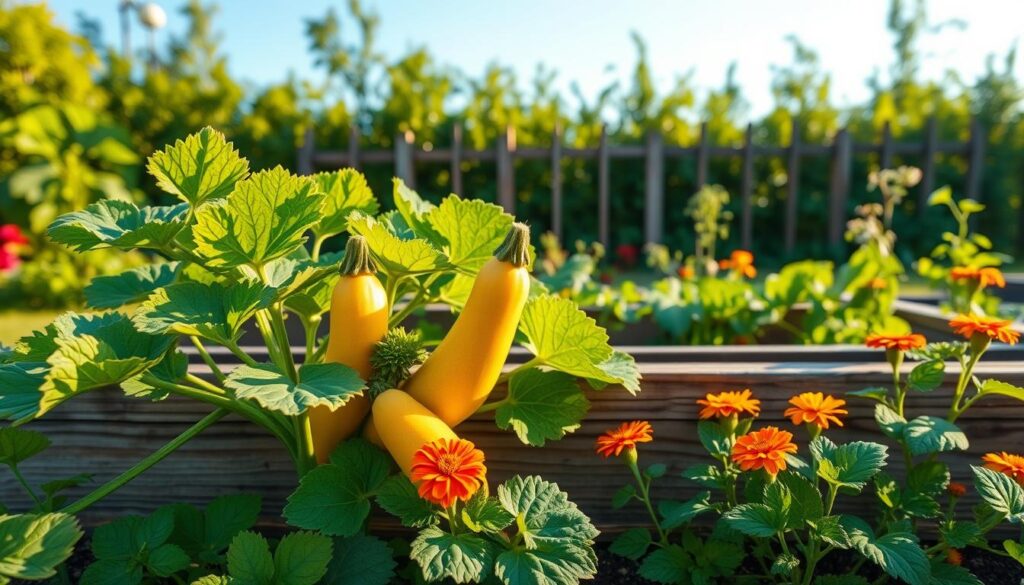
Using Herbs as Zucchini Companions
Incorporating herbs as zucchini plant buddies can significantly enhance your garden’s health and productivity. These herbs not only provide culinary benefits but also support zucchini companionship through natural pest control and nutrient sharing.
Dill
Dill is a fantastic choice among herbs for zucchini. This herb attracts beneficial insects like ladybugs and lacewings, which help control pests such as aphids. Furthermore, dill’s fragrant blooms add beauty to your garden and can enhance pollination for your zucchini plants.
Oregano
Oregano offers many advantages as a companion for zucchini. Its strong aroma acts as a natural deterrent to various pests, helping protect your zucchini from harm. The ground cover that oregano provides can also suppress weeds, reducing competition for nutrients and water.
Thyme
Thyme, another beneficial herb, plays a vital role in attracting pollinators and beneficial insects to your garden. It fosters a healthy ecosystem and works harmoniously with zucchini, encouraging robust plant growth. Including this herb alongside your zucchini plants enhances the flavor of your culinary creations.
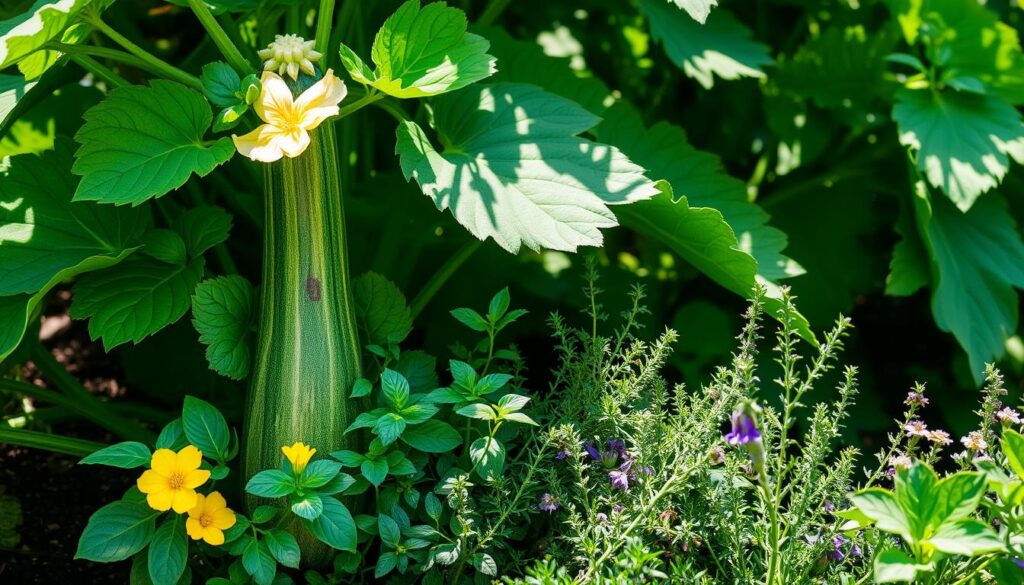
| Herb | Benefits | Attracts |
|---|---|---|
| Dill | Controls aphids and enhances pollination | Ladybugs, lacewings |
| Oregano | Deters pests and suppresses weeds | Pollinators |
| Thyme | Encourages healthy ecosystem | Beneficial insects |
The Role of Flowers in Companion Planting
Incorporating flowers into your zucchini garden companions not only enhances visual appeal but also plays a crucial role in creating a thriving ecosystem. The right flowers can attract pollinators and beneficial insects, which support the growth and health of zucchini plants. Understanding how flowers fit into companion planting strategies can significantly boost your gardening success.
Sunflowers
Sunflowers offer numerous benefits when planted alongside zucchini. Their towering height provides a natural support structure for climbing plants while their bright yellow blooms are irresistible to pollinators like bees. By attracting these essential insects, sunflowers help improve zucchini pollination, leading to better fruit set and yield.
Borage
Borage is another superb addition to your zucchini garden companions. Known for its star-shaped flowers, it is favored for attracting pollinators. Borage also serves a dual purpose by repelling certain pests that might otherwise harm your zucchini plants. Moreover, its deep roots can help enrich soil health, giving your garden the nutrients it needs to thrive.

| Flower | Benefits for Zucchini | Attracts |
|---|---|---|
| Sunflowers | Provides height, supports climbing plants, attracts bees for pollination | Bees, butterflies |
| Borage | Repels pests, enriches soil | Pollinators, beneficial insects |
Incorporating these flowers into your garden illustrates the integral role of flowers within companion planting strategies. The right floral companions not only enhance aesthetics but also create a vibrant and healthier zucchini garden.
Best Vegetables to Plant with Zucchini
Creating a thriving garden includes selecting the right vegetables to plant alongside zucchini. Utilizing effective zucchini planting combinations can significantly impact your harvest. The best companions for zucchini not only enhance the growth of your zucchini plants but also contribute positively to the overall health of your garden.
Corn
Corn serves as a natural support structure for zucchini. Its vertical growth offers necessary shade and protection to the sprawling zucchini leaves. Additionally, corn and zucchini share similar nutrient requirements, making them ideal partners in your garden.
Beans
Beans are exceptional nitrogen-fixing plants. When planted with zucchini, they help improve soil nutrient levels. This relationship is beneficial, as beans enhance the soil’s fertility, positively influencing the growth of zucchini. Incorporating beans into your zucchini planting combinations can yield a more robust garden.
Peppers
Peppers thrive well alongside zucchini due to their non-competitive nature regarding nutrients. They flourish in similar soil conditions without vying for the same resources, making them excellent companions. This pairing helps maintain an efficient use of garden space while fostering a diverse crop environment.
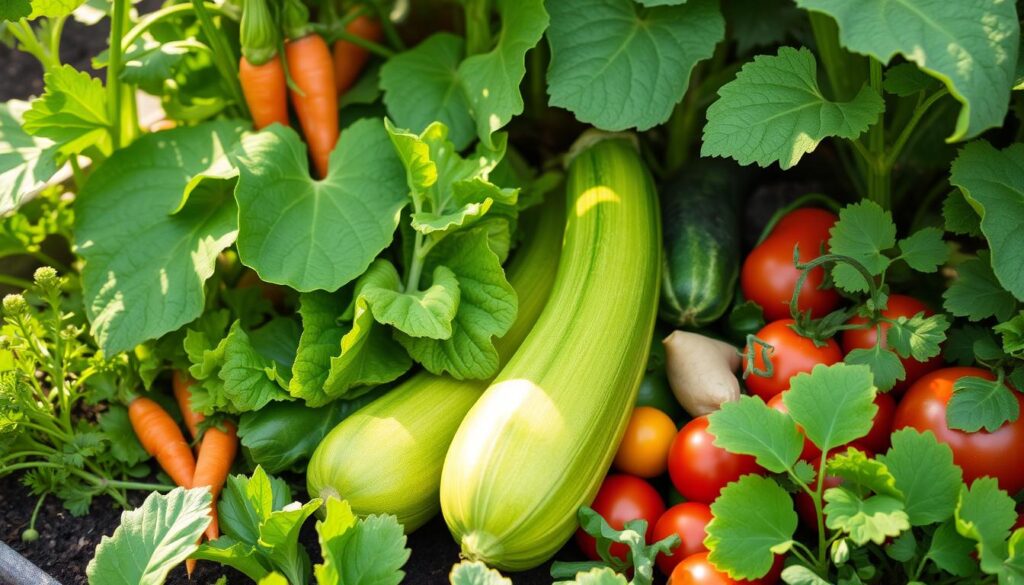
| Vegetable | Benefits | Growth Compatibility |
|---|---|---|
| Corn | Acts as a support structure; improves shade | Shares nutrient needs |
| Beans | Nitrogen-fixing; enhances soil fertility | Pairs well in the same soil conditions |
| Peppers | Non-competitive with nutrients; diverse addition | Thrives without resource competition |
When planting vegetables with zucchini, remember that diverse planting strategies not only enhance yields but also improve garden health overall. These unique pairings allow for a flourishing ecosystem to develop in your garden, leading to fruitful harvests.
Importance of Plant Spacing with Companions
Proper plant spacing plays a crucial role in optimizing the growth of zucchini and its companion plants. Understanding the importance of spacing allows you to create an ideal plant layout that promotes healthy development and minimizes competition for resources. Without sufficient space, your zucchini garden may suffer due to inadequate light, water, and nutrients.
How Spacing Affects Growth
When plants are positioned too closely, they can compete for essential resources. This crowding leads to weaker plants that struggle to thrive. A well-thought-out zucchini garden layout enhances air circulation and reduces moisture retention, which is vital for preventing diseases. Each companion plant benefits from its designated space, allowing your garden to flourish.
Tips for Ideal Planting Layout
To achieve a successful zucchini garden layout, keep the following tips in mind:
- Space zucchini plants at least 36 to 48 inches apart to ensure they have ample room to grow.
- Group companion plants strategically to maximize the benefits of spacing. For example, place tall plants like corn to the north side of zucchini to avoid overshadowing them.
- Consider companion plant maturity when arranging your layout. Fast-growing plants can occupy space temporarily, allowing slower growers to catch up.
| Plant Type | Recommended Spacing (inches) | Benefits of Spacing |
|---|---|---|
| Zucchini | 36 – 48 | Allows for proper growth and air circulation |
| Marigolds | 12 – 18 | Deters pests and attracts beneficial insects |
| Basil | 12 – 15 | Enhances flavor of zucchini and repels pests |
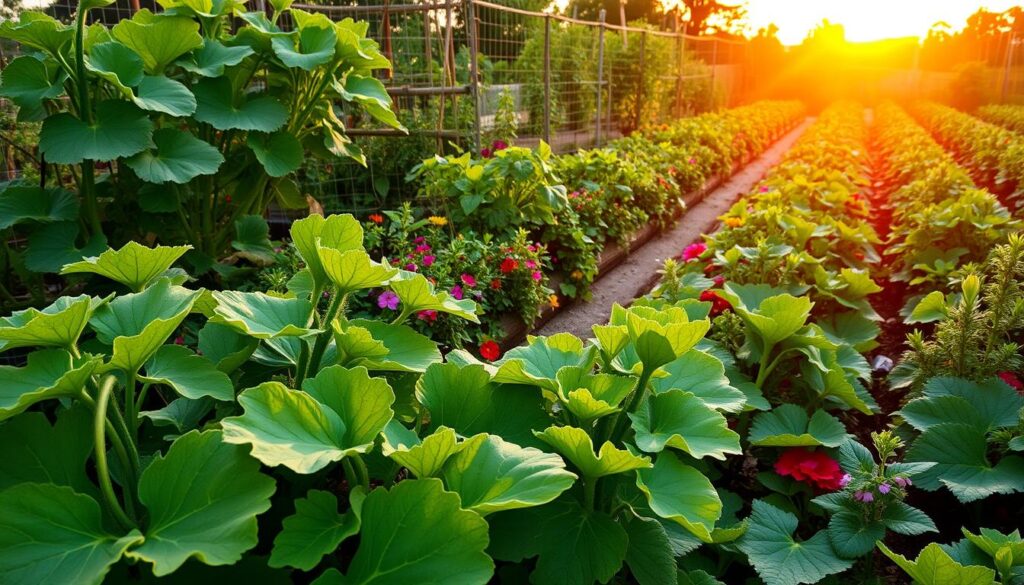
By prioritizing the importance of spacing and implementing an ideal plant layout, you will set the stage for a vibrant and productive zucchini garden. Every inch counts, contributing to a thriving ecosystem where both zucchini and its companions flourish. Remember to observe and adjust your layout as needed to promote health and growth throughout the growing season.
Seasonal Companion Planting Strategies
When engaging in seasonal gardening strategies, knowing what to plant during each part of the year can significantly improve your garden’s health and productivity. Spring planting with zucchini gives you a fantastic start, allowing fast-growing companion plants to thrive. The selection of seasonal companion plants adapts as the year progresses, ensuring optimal growth and yields from your zucchini.
Spring Planting Ideas
In spring, the ground begins to warm, making it an excellent time for sowing seeds. Consider planting radishes alongside zucchini. These fast-growing vegetables not only utilize garden space efficiently but also help break the soil apart, aiding zucchini’s growth. Adding marigolds will attract pollinators and can deter some pests, enhancing the whole garden’s ecosystem.
Summer Companions
As summer rolls in, your zucchini plants need support from other robust crops. Corn and beans are perfect partners during this season. They provide structural support and nitrogen, respectively. These plants thrive alongside zucchini, allowing your garden to fully utilize the available nutrients in the soil.
Fall and Winter Considerations
Even as the seasons change, your garden can benefit from careful planning. In fall, planting cover crops such as clover can enrich the soil and protect it over winter. This strategy helps prepare your garden for the subsequent planting season, ensuring a healthy system for spring planting with zucchini.
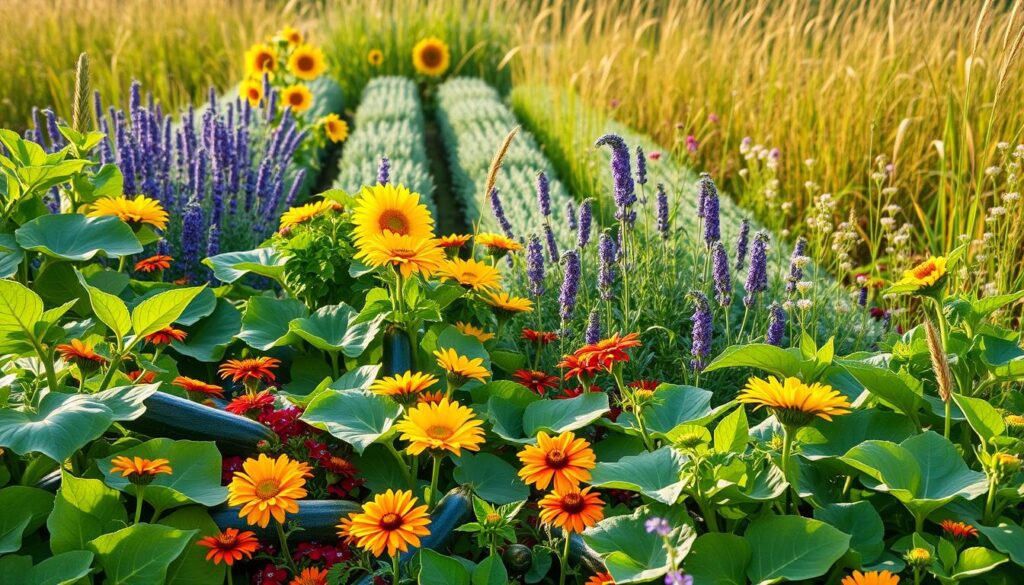
The Benefits of Companion Planting for Pest Management
Companion planting offers effective pest management strategies that not only enhance the growth of your plants but also protect them from threats. By understanding the synergy between plants, you can utilize specific companions to create an environment where beneficial insects thrive while deterring harmful pests.
Attracting Beneficial Insects
Utilizing companion plants for pest control effectively draws in beneficial insects such as ladybugs and lacewings. These insects play a crucial role in maintaining garden health by preying on aphids, caterpillars, and other pests. For instance, planting nectar-rich flowers alongside your zucchini can significantly enhance the presence of these helpful allies.
Repelling Harmful Pests
Some plants have natural qualities that repel unwanted pests, thus reducing the need for chemical interventions. For example, marigolds are known for their ability to deter nematodes and other pests, making them an ideal companion for zucchini. By leveraging these plants’ traits, you can further enjoy the benefits of companion planting while promoting a resilient garden ecosystem.

| Companion Plant | Pest Deterrent | Beneficial Insects Attracted |
|---|---|---|
| Marigolds | Nematodes, aphids | Ladybugs, lacewings |
| Basil | Whiteflies, mosquitoes | Hoverflies |
| Nasturtiums | Caterpillars, aphids | Predatory beetles |
Incorporating these strategies into your gardening practice will undoubtedly enhance plant resilience and create a vibrant ecosystem in your garden.
Companion Plants for Shade
Not every garden spot basks in the sun all day. Embracing the opportunities of shaded zones can enhance your gardening experience. Several shade companion plants pair beautifully with zucchini, providing mutual benefits. One of the significant zucchini shade benefits includes protection from intense sunlight, which can lead to heat stress and sunburn. Besides offering shelter, shaded garden companions also contribute to an environment that can promote healthy growth.
What to Plant in Partial Shade
When considering shade companion plants, look for varieties that thrive in less sunlight. Some excellent options for planting alongside zucchini include:
- Leafy greens such as spinach and lettuce
- Herbs like chives and parsley
- Radishes, which are quick-growing and do well in partial shade
Benefits of Shade for Zucchini
Integrating shaded garden companions offers numerous advantages for your zucchini plants. A cooler environment reduces thermal stress during peak heat, ensuring your zucchini remains productive. Additionally, shade can aid in moisture retention, thereby reducing the necessity for frequent watering. The right shade companion plants also help suppress weeds, creating a more balanced ecosystem within your garden.
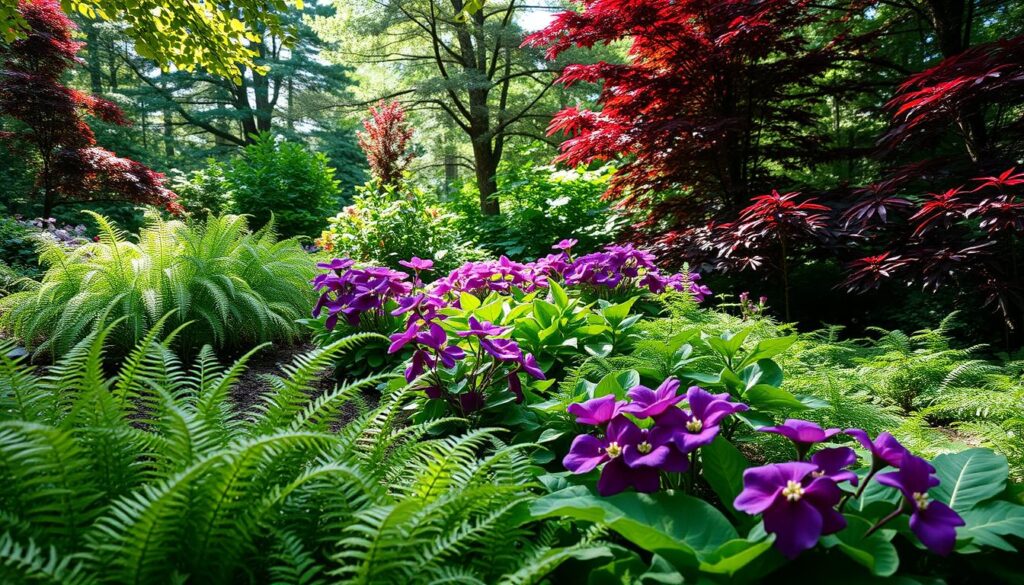
| Shade Companion Plants | Benefits |
|---|---|
| Leafy Greens | Utilize vertical space and enhance soil quality |
| Chives | Repels pests and adds flavor to your meals |
| Radishes | Quick turnover crop that prevents soil erosion |
How to Incorporate Companion Plants in Your Garden
Incorporating companions into your garden can enhance growth, improve yields, and even deter pests. Effective garden layout tips can help you create a thriving environment for both zucchini and its companion plants. Utilizing strategic planting methods allows for optimizing space and maximizing your harvest.
Planning Your Garden Layout
Begin with an effective garden layout that suits your space. When planning, consider factors such as sunlight, soil type, and drainage. Grouping plants with complementary needs will provide them with the best chance to flourish. When employing garden layout tips, aim for a design that allows adequate air circulation around your zucchini and its companions to reduce disease risk.
Companion Planting in Raised Beds
Raised beds can significantly ease the process of incorporating companions. These structures provide excellent drainage and soil control. Consider planting marigolds alongside zucchini to ward off pests. When using raised beds, both the gardening techniques and your creativity can shine, allowing for dynamic and visually attractive combinations of plants.
Container Gardening with Zucchini
Utilizing container gardening strategies allows you to maximize small spaces while enjoying a variety of crops. Zucchini can thrive in containers when combined with compatible companions. Opt for herbs like basil or dill, which can enhance flavor and deter pests. Ensuring proper pot size is crucial, as zucchini requires space for root development. With proper attention to watering and fertilization, container gardening can yield delicious results.
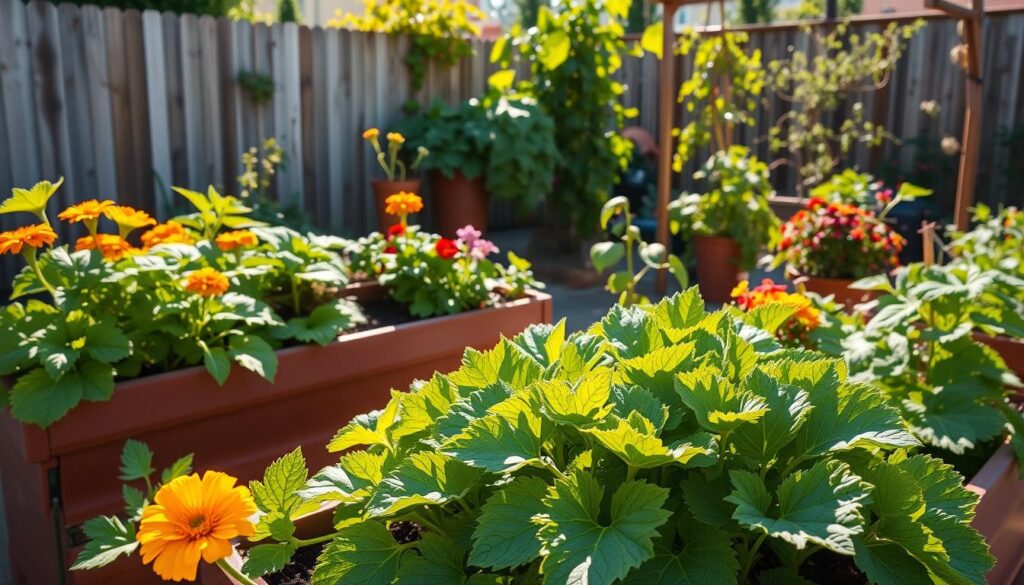
Companion Planting Myths Debunked
Many gardeners embrace companion planting as a technique to enhance crop yields and control pests. Often, though, misunderstandings arise surrounding its effectiveness. You might have encountered various companion planting myths that can lead to poor gardening decisions. It’s essential to engage in debunking myths to promote clear thinking about how to best utilize companion plants in your garden.
Common Misconceptions
Some popular misconceptions suggest that all plants benefit from pairing together, while others claim that specific combinations will always succeed. Without evidence-based gardening practices, these ideas can mislead you. For instance, some believe that simply planting any flower near vegetables will deter pests, ignoring the complexity of plant interactions and ecological balance.
Evidence-Based Practices
Scientific studies provide valuable insights into companion plant relationships. Research has shown that certain combinations do promote growth and combat pests effectively. By understanding these evidence-based gardening practices, you can make informed decisions in your gardening endeavors. Keep in mind that the best companion planting strategies align with real-world data rather than myths. Embracing facts not only enhances your gardening success but also allows you to create a lush, thriving environment for your zucchini and its companions.
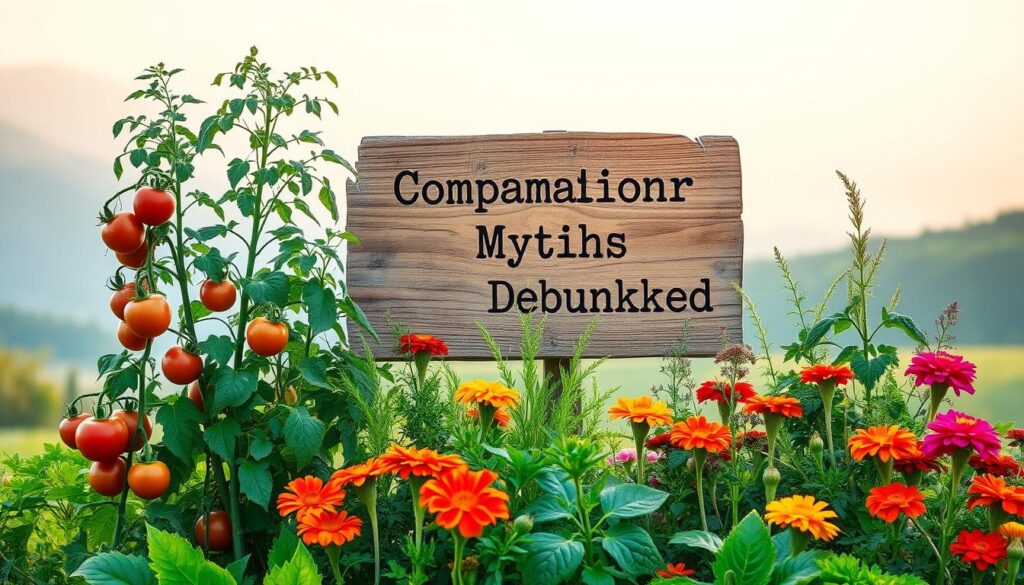
The Impact of Soil Quality on Companion Planting
When it comes to companion planting, the impact of soil quality cannot be overstated. Understanding your soil’s composition sets the foundation for gardening success, particularly with zucchini and its companions. Testing your soil for gardening is a crucial first step in ensuring the best growing conditions for your plants.
Testing Your Soil
To effectively assess your soil’s health, consider conducting a soil test. This process reveals essential information about nutrient levels, pH balance, and organic matter presence. With this data, you can make informed decisions that directly affect your zucchini and its companions. You can choose from several methods to test your soil, including:
- DIY testing kits available at garden centers.
- Sending samples to local agricultural extensions for comprehensive analysis.
- Utilizing in-field test strips for quick assessments.
Improving Soil Health
Improving garden soil is essential for creating a productive growing environment. Incorporating organic matter such as compost or well-rotted manure enriches the soil, enhancing its structure and nutrient content. Here are some effective techniques for improving soil quality:
- Add compost regularly to replenish nutrients and improve soil texture.
- Plant cover crops like clover or vetch during off-seasons to enhance soil fertility.
- Rotate crops annually to prevent nutrient depletion and reduce pest pressure.

Conclusion: Create Your Ideal Zucchini Companion Garden
Creating a zucchini garden can be an incredibly rewarding endeavor, especially when you incorporate the right companion plants. Throughout this article, we’ve explored various ideal zucchini garden companions that not only support your zucchini but also enhance the overall health and productivity of your garden. From aromatic herbs like basil and dill to vibrant flowers such as marigolds, every companion plant serves a unique purpose in fostering a thriving environment.
It’s essential to review the key points discussed for a successful companion planting strategy. Remember to consider factors like soil quality, plant spacing, and seasonal adjustments, which are crucial for nurturing a bustling ecosystem in your garden. By employing these strategies, you can improve pest management, nutrient sharing, and even soil health, leading to a more fruitful and balanced gardening experience.
Now that you’re equipped with knowledge on crafting your ideal zucchini garden, it’s time to take action in your garden. Create an action plan for gardening that involves selecting your companion plants, preparing your soil, and mapping out your planting layout. By implementing the tactics covered in this article, you’ll be well on your way to enjoying a bountiful and sustainable zucchini harvest.
